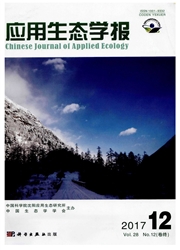

 中文摘要:
中文摘要:
为研究朱砂叶螨抗性品系不同温度下的适合度,在抗性选育基础上,通过组建朱砂叶螨相对敏感品系(S)、抗阿维菌素品系(AbR)和抗甲氰菊酯品系(FeR)在不同温度(15℃、20℃、25℃、28℃、31℃、34℃和36℃)下的生命表,比较相对敏感品系和抗性品系在不同温度下的发育历期、生殖力和内禀增长率等种群特征参数.结果表明:朱砂叶螨AbR和FeR品系的发育历期在15℃时较S品系明显延长,在20℃~28℃下生殖力较S品系有所下降;两个抗性品系的相对适合度(以rm值表示)在15℃时低于敏感品系,存在一定适合度代价,在20℃~31℃时,适合度与敏感品系相似,适合度代价不明显,但在高温下(≥34℃),FeR品系适合度代价明显,而AbR品系存在抗性适合度优势.
 英文摘要:
英文摘要:
Based on resistance selection, the life tables of abamectin-resistant ( Abl/), lenpropath- fin-resistant (FeR), and susceptible (S) strains of Tetranychus cinnabarinus at 15 ℃, 20 ℃, 25 ℃, 28 ℃, 31 ℃, 34 ℃, and 36 ℃ were constructed, and the development duration, fertility, and intrinsic rate of increase (rm) of the strains were compared, aimed to understand the relative fitness of T. cinnabarinus resistant strains at different temperatures. The results indicated that compared with S strain, AbR and FeR strains had longer development duration at 15 ℃ but lower fertil- ity at 20 ℃-28 ℃, and their relative fitness ( represented by rm ) was smaller at 15 ℃ but similar at 20 ℃-31 ℃. For AbR and FeR strains, the fitness cost was moderate at 15℃ but lower at 20 ℃- 31 ℃. However, at high temperatures ( ≥34℃ ) , FeR strain possessed remarkable fitness cost while AbR strain showed better fitness.
 同期刊论文项目
同期刊论文项目
 同项目期刊论文
同项目期刊论文
 Molecular characterization and expression of three heat shock protein70 genes from the carmine spide
Molecular characterization and expression of three heat shock protein70 genes from the carmine spide Estimation of realized heritability of resistance to fenpropathrin, abamectin, pyridaben and their m
Estimation of realized heritability of resistance to fenpropathrin, abamectin, pyridaben and their m 期刊信息
期刊信息
